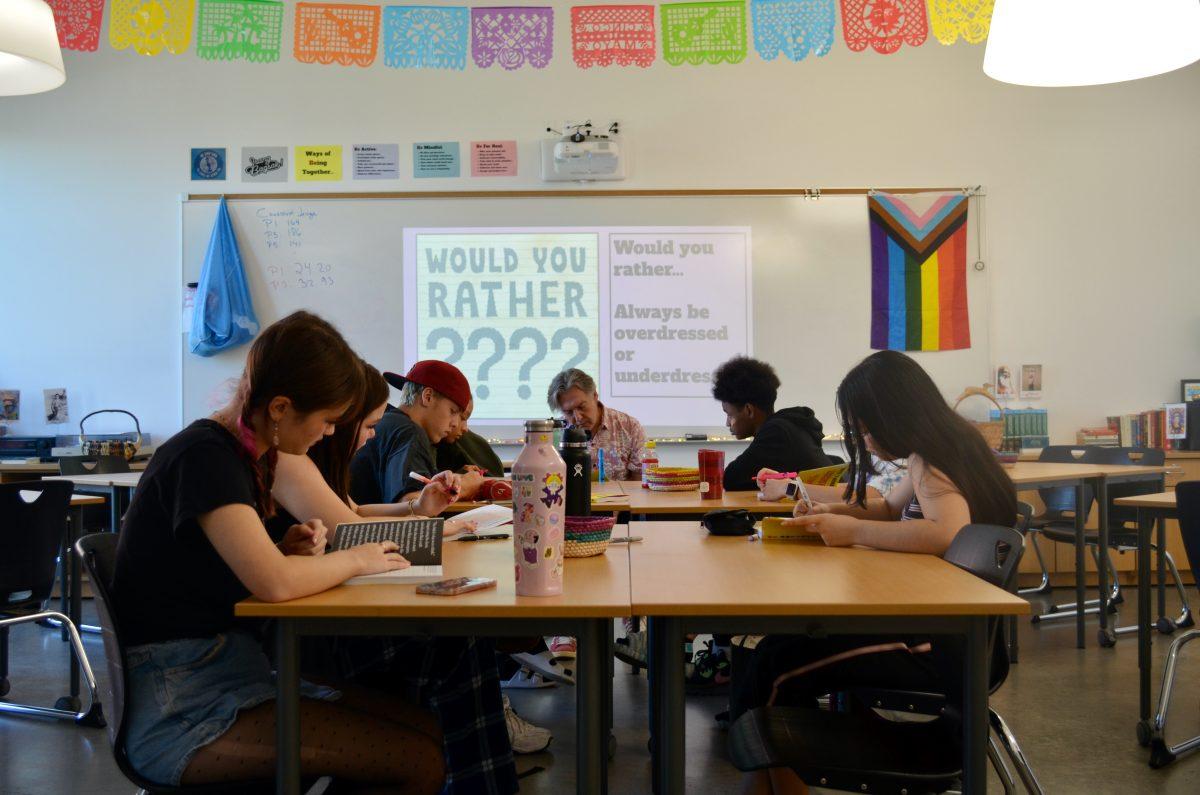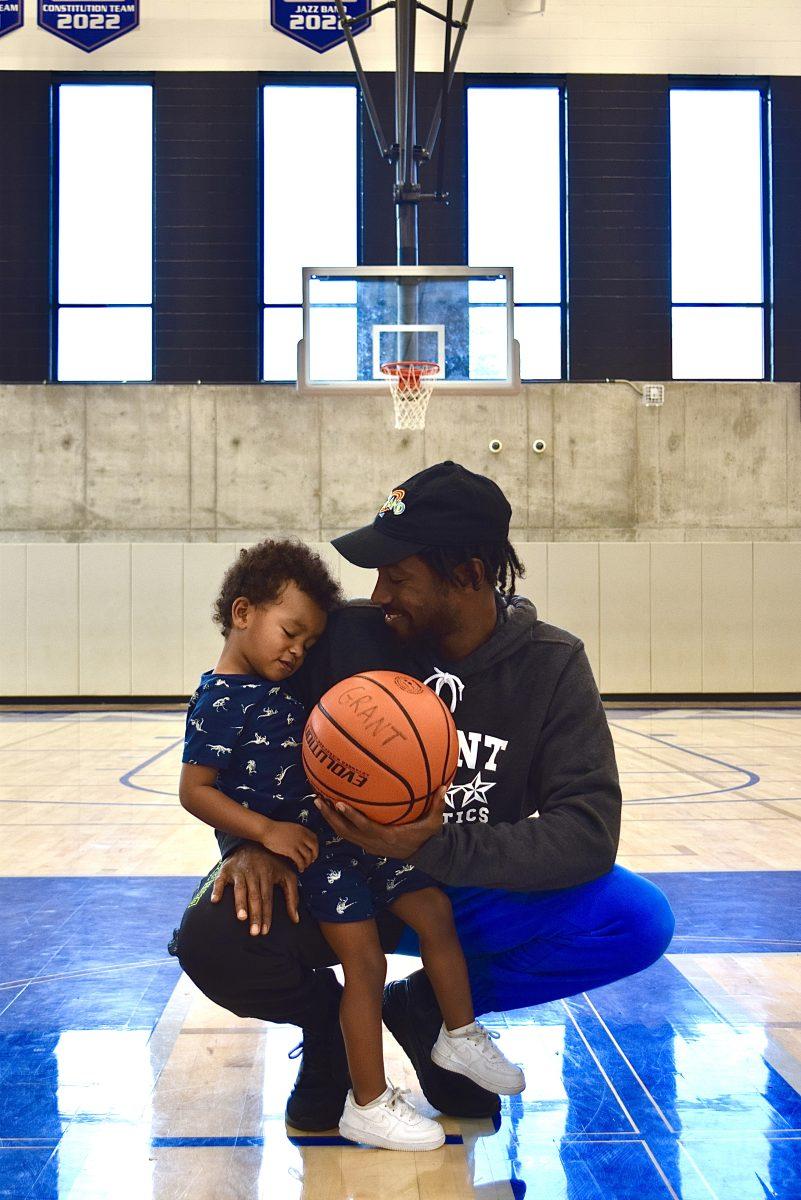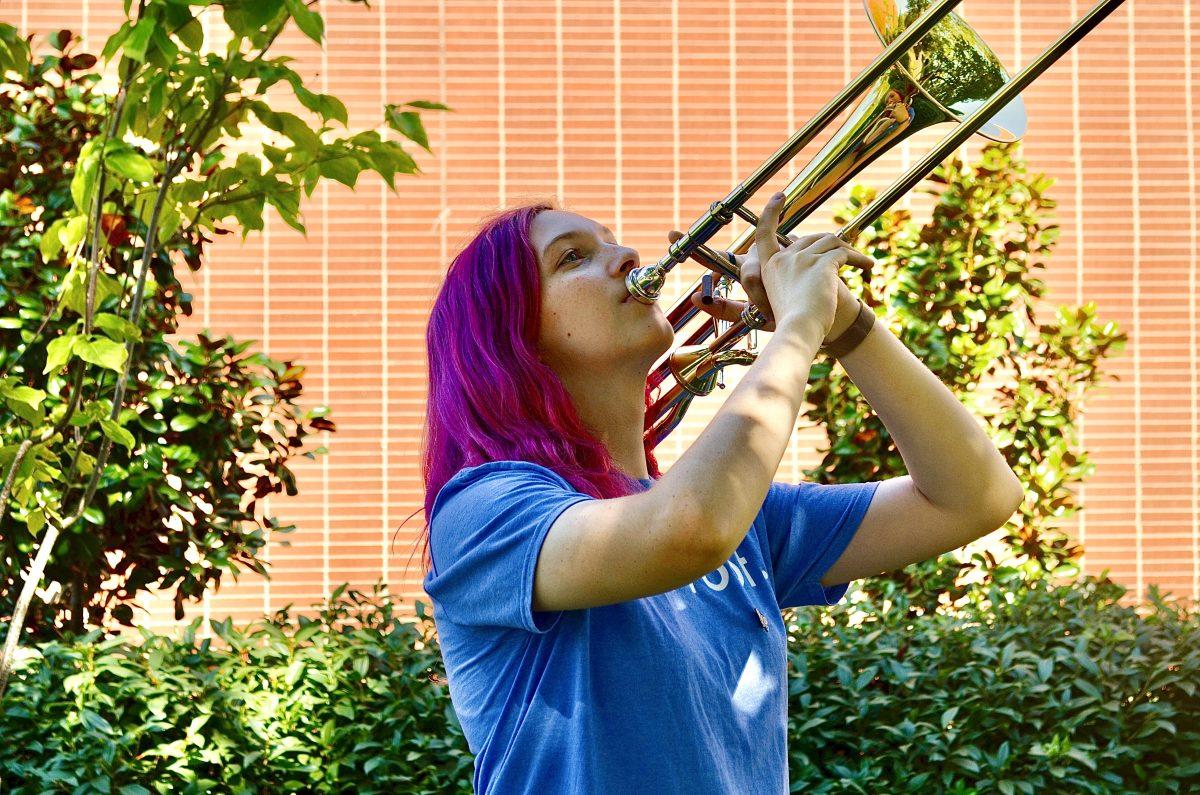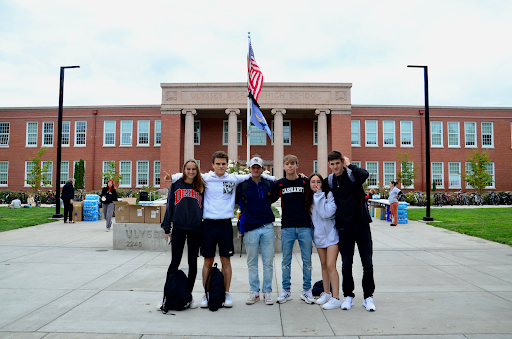Since its inception, Race Forward has been a staple of every Grant student’s high school experience. That ends this year: James McGee decided to pause the program for the foreseeable future, and no one is sure what is going to come of it.
For the first time since 2016, there will be no Race Forward at Grant this year. Principal James McGee decided to pause the program for the 2022-23 term, effectively putting a stop to school-wide race-based conversations at an overwhelmingly white school.
McGee says he made the decision after students of color, most of whom were Black, came to him with concerns about the curriculum. “They felt that it was performative and not doing much to address some of the challenges that we face as a society and here at Grant High School,” he says.
McGee says that after hearing from over a dozen individuals, he went to Black Student Union (BSU) and Movimiento Estudiantil Chicano de Aztlán (MEChA) meetings to ask members their thoughts on the issue. “The consensus there was that they did not think (Race Forward) was working,” says McGee.
He says the conversation with BSU was only between him and four of five members, most of whom graduated last year.
Amaya Taylor, now a freshman at the University of Oregon, was one of the former students whom McGee consulted before making his decision. Taylor was a Race Forward student facilitator and a BSU leader last year. “It was hard trying to force kids to talk about race, especially if they’re talking about you, a person of color,” she says, “I’ve watched a lot of people skip or not attend ‘cause they think it’s stupid.”
She also says that a number of other BSU members have felt the same way. “I had talked with the kids, asked a lot of them how they felt and why some of them weren’t attending,” she says, “Going all our lives to schools that are predominantly white, you already feel singled out, and a lot of kids were feeling more singled out because now they were forced to talk about their culture to a class of white people.”
Taylor says that the program also did have its benefits: “It was good because we started to open uncomfortable conversations and tell people that it’s okay to have uncomfortable conversations.”
On the flip side, Meir Tucker, a current Grant senior and one of this year’s BSU leaders, says she was shocked when she heard that the program had been paused.
Tucker says she only learned about the pause when Grant Magazine requested an interview with her regarding the topic. Grant administrators still haven’t informed affinity groups, let alone the greater student body, of the decision.
McGee had not thought to tell the student body about the pause until Grant Magazine inquired about his plan to do so. “That could’ve been an oversight,” he says, “It’s not something I had thought about, but it wasn’t an intentional omission.”
Tucker believes that the decision to put Race Forward on pause was not warranted. “I feel it was uncalled for because (Race Forward) was started to bring up racial issues that are going on around the school and around the community,” she says.
However, she also recognizes the faults within the program. “I feel like we could have done something else to reform it, to fix it,” she says, “It’s not for us Black students, we don’t need to learn about what we already go through.”
Naime Overton, also a BSU member, agrees. “I think him pausing it maybe wasn’t the best idea, but I feel like it should have been approached in a different way,” she says.
She does say, though, that having an environment where she could speak about her experiences with racism at Grant was overall a positive thing. “It was good to be able to put the rest of the class on hush mode because they can’t say anything when it comes to stuff they don’t know.”
The decision also comes after one of last year’s Race Forward slideshows received backlash from Parents Defending Education, a national organization whose website states their goal as being to “reclaim our schools from activists promoting harmful agendas.”
An article published in January 2022 on their website displays the slideshow and denounces the included definitions of “whiteness,” “white fragility,” “white tears” and “white saviorism,” characterizing them as “derogatory against people who are considered ‘white.’”
KATU reported on the incident in a segment that included an interview with Nicole Neily, the founder of Defending Education. She said that a parent anonymously sent the slideshow to the organization. Grant faculty members and the students who created it were the only ones with access to the presentation before it was shared.
The article by Defending Education also included other examples of “Critical Race Theory” in Portland Public Schools (PPS), like the Climate Justice Committee, resources for undocumented people and the district’s Racial Educational Equity Policy.
McGee says that none of this coverage had any influence over his decision to pause Race Forward.
Race Forward came before debates over Critical Race Theory started to dominate national media coverage, but is a prime example of the kind of educational program that right-wing organizations campaign against.
Race Forward occurred for the first time during the 2015-16 school year in response to racist incidents at Grant that prompted the need for facilitated conversations around race and equity within the community. It was born after months of internal meetings between Grant administrators, students and PPS equity team members, the result of which was a 90-minute facilitated conversation followed by a 25-minute assembly summarizing the topics discussed.
The first presentation and discussion, held in March 2016, featured questions like, “When was the first time you were aware of race?” and “How do you observe race in the media? Our community?”
Grant Magazine reported that overall, the first Race Forward was well-received by Grant students and faculty even though a fair amount of students made the choice not to attend. The community was cautiously optimistic about the steps they were taking to combat racial discrimination around Grant.
In 2017, as Race Forward became a steady facet of life at Grant, the school began to offer an Equity class whose sole purpose would be to plan and put on Race Forward.
Tommi Meyer, who graduated from Grant in 2021, was a member of the inaugural class in his junior year. He had been a part of Equity Club and student leadership before that and had worked on Race Forward-related issues within those groups. “It was, like, 85% students, 15% admin when it came to who was doing the organizing,” says Meyer.
Students in the class worked to formulate topic ideas for each conversation. Examples include murals at Grant that depicted Indigenous people in an inaccurate light, gentrification in Albina and the prison industrial complex. “We have to think about how we can put on a slideshow effectively and without harming anyone,” Anna Gates, a former member of Equity says, “Even if they’re important subjects, we can’t do it if we can’t present it sensitively.”
After a topic was agreed upon, the class divided up into different groups to tackle the many aspects of putting on Race Forward: facilitation training, faculty education and finalizing the presentation itself.
Race Forward’s goal was to engage the Grant community in comprehensive talks about race and race-based oppression. To do this, Equity planned out detailed discussion questions and activities to help ensure that students participated and came away with new knowledge and insight. “We think of (questions) that will get conversations going, that are most engaging and will teach everyone more,” Gates says.
Equity’s teacher was the most prominent adult involved in running the program. “My job was to teach students about systems of racism, and also help them plan Race Forward,” says Mykhiel Deych, who taught the class for the last two years.
Deych no longer teaches Equity. They say that it was unreasonable to expect 30 students and one teacher to plan a school-wide event with little other support. “I was literally the only adult that organized the whole thing with the students,” they say, “I needed more people involved.”
Deych says that administrators told them that more resources were not available, so they stepped out of the role.
After every Race Forward, students were asked to fill out exit tickets that provided the Equity team with feedback on their experiences. Ivey Buenning, a Grant senior and former Equity student, says they took the input very seriously. “We processed every single exit ticket, and tried our best to learn from what we heard.”
Meyer says that 40-50% of exit tickets included the sentiment that Race Forward shouldn’t take place, which the class generally disregarded. The other half was split into two categories: positive feedback and criticism that they would take into account. “A really big question that came up a few times was, ‘How can we avoid retriggering students of color, and how can we move away from all of the white students in the room looking to the few students of color for answers?’” he says.
Since its inception, there has been a massive issue with students choosing not to attend Race Forward. Meyer says that getting students to come was hard because it took the place of a flex period, which people were reluctant to give up. “There was one time where we, like, locked the doors, so students couldn’t just leave, and we tried taking attendance, which was also met with a lot of resistance.”
There were only two Race Forwards last year as the program worked to get back up and running after being forced online during the COVID-19 pandemic. The topics were “Deconstructing Whiteness” and “Gentrification in Albina,” which could very well have been Race Forward’s final two presentations.
Students and administrators alike are not yet sure what the future of Race Forward is, or if it has a future at all. McGee says that there is not a concrete plan for the continuation of conversations about equity moving forward. “We’re thinking about it,” he says, “We’re going to involve site council, climate council and I would love for students in Equity to be involved as well.”
Equity class has undergone a number of changes since last year, and almost didn’t exist this year because so few students forecasted for it. Currently, there are eight students in the class.
The class has a new teacher, Christopher Hawking, and unlike past years, returning students are not allowed to take it again. This means that there is no one in Equity who has experience planning and putting on a Race Forward presentation.
Hawking says the decision to not allow returning students to come back to the class was made jointly by him and administrators. “It was a choice we made because Race Forward isn’t here, and that means a lot of the content we were doing would be repeat.”
Buenning was frustrated when she was told she would not be allowed back into the class. “Equity class has always been mostly returning students, and personally, I have learned so much essential knowledge from them.
Gates agrees. “Without returning students in the class, moving forward with Race Forward or anything like it is going to be really difficult.”
Buenning also says that returning Equity students who are barred from coming back to the class will likely come together through the Equity Club.
With no Race Forward to plan, Equity class has shifted to much more of a traditional class setting than it has been in the past. “We have social justice learning standards, like identity, diversity, justice and action,” Hawking says, “But there’s still a part of the class that has to be action-focused.”
Hawking and his eight Equity students met with McGee to discuss the role of the class moving forward and the reasons for Race Forward’s pause.
McGee says that while there is no current plan to involve Equity class with conversations about restarting Race Forward or other equity work, he hopes that a partnership forms moving forward. “I would love for students in Equity to be involved, but it’s important that we not only include students who are in the Equity class but that we include students as a whole.”
Right now, Equity students are focusing on providing cultural awareness training to faculty in order to make classrooms and conversations about race more comfortable for students of color. “Teachers need to be aware and sensitive to the fact that there are a lot of different students in the room with different backgrounds,” says Sarai Ballerstedt, a student in the class.
Tucker, Taylor and Overton have their own ideas for how Race Forward should be changed and improved.
Tucker says that she wants to see more students of color involved in the planning and facilitating of Race Forward. “For our Black students to feel more comfortable with Race Forward, I feel we need to create topics about what issues are specifically in Grant High School that need to be touched on and fixed.”
She adds that she wants BSU to talk to McGee about the pause, and hopefully work with him to improve and bring back race-related conversations at Grant.
Taylor says that rather than having isolated Race Forwards once every quarter of the year, she would like to see education around racism and oppression embedded into the standard curriculum. “Why not implement it in our whole education throughout the year, and learn about different cultures and have that as a major part of our education?”
Overton wants affinity groups to be consulted as Race Forward is reimagined and revitalized in the coming months. “They should talk to the affinity groups about what they want to see, and make it a mandatory thing, or have more consequences if you skip it.”
McGee says that moving forward, his goal for conversations about race at Grant is that they happen in an open and honest way. “I don’t know if it’s happening in a way that we would like. A lot of people are afraid to say anything out of fear that they’re going to say the wrong things, and we’ll never have those real conversations with each other.”
No one can say when race-based conversations will start happening regularly again, and what the implications of their absence will be for students across the school. Until something of the sort resumes, life will look a little different at Grant.



































